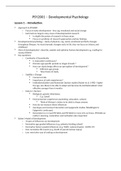PSY2001 – Developmental Psychology
Lesson 1 – Introduction.
Approach to PSY2001
o Focus on early development - key cog, emotional and social change
o Each lecture targets a key areas of developmental research
In depth discussion of research in those areas
Focus on synthesis of research approaches and key findings
Developmental psychology - study of physical, cog, social, emotional and behv changes
throughout lifespan. As most dramatic changes early in life, thus we focus on infancy and
childhood
Aims of developmental - describe, explain and optimize human development e.g. reading for
young children
Key questions
o Continuity v Discontinuity
Is maturation continuous?
Discrete age-specific periods or stages (Freud) ?
How can study design affect our perception of development?
Different age groups
Time frame of study
o Stability v Change
Concerns traits
Importance of early experiences?
Institutionalization and Romanian Orphan studies (Rutter et al, 1998) - higher
the age, less likely to be able to adapt and become de-institutionalized. Most
effective younger than 6 months
o Nature v Nurture
Biological: genetic inheritance
E.g. Gesell
Environmental: experiences (parenting, education, culture)
Think of Watson's claims to be able to shape anyone
How do we measure these influences
Genotype-environment interaction and epigenetic studies (Waddington's
Epigenetic Landscape)
Remember to re-read PSY1003 and PSY1002 for more info on these. PSY1006 on
instinct, learning, maturation and motivation also important
Baltes' Model of Development
o 3 types of influences on development
o Normative age-graded influences (e.g. puberty/starting school)
o Normative history-graded influences (e.g. WWII, natural disaster, COVID-19)
o Non-normative life events (e.g. death of parent/serious injury)
o Less restrictive way of looking at development
, o
Bronfenbrenner's Ecological Model of Human Development
o Focus on development in context of ecology
o Microsystem - individual experiences
o Mesosystem - links in settings in which the individual participates
o Ecosystem - settings that the individual does not participate in directly, but still effects the
individual
o Macrosystem - general ideology and organization of social institutions and cultures
o Idea that the higher circles can affect lesser circles
Factors in research
o Age
o Cohort
o Time of testing
Research designs
o Note on observational studies
Were in favor between 1920-30 (Piagetian development) but dropped out of
fashion during the behaviorist movement
Came back with a vengeance in the 50s and 60s with Ainsworth's Strange
Situation
o Cross-sectional studies
Different ppts, different ages, same time
, Cost effective
Quick
Most often used
Confounds
Might miss certain changes
Doesn’t factor in non-normative life events
Cohort effects
Individual differences
Does not go into casual processes involved
o Longitudinal studies
Same ppts, different ages, different times
Time-consuming
High attrition rate
Original research question may not be viable as study completes
o Cohort studies
Different ppts, same ages, different historical time
Time consuming
Danger of research question becoming obsolete
High attrition rate
o Cohort-sequential studies
Different and same participants, different and same ages, different and
same historical time
High attrition rate
Time consuming
Question may become obsolete
o
o Focus on cross sectional and longitudinal studies
o Twin studies
MZ twins (100%)
DZ twins (50%)
Confounding effect of environment
Also the tendency to treat MZ twins more alike than DZ twins
o Adoption studies
Rearing environment from adoptive parents
, Genetic inheritance from biological parents
Whom do they resemble most
Self-selecting sample
Issue of differing ages of adoption confounding studies
Cross-fostering experiments - people adopt children close to them in
background
Other influences/ways of studying development
o Evolutionary psychology
Does human ancestry tell us about ourselves now?
E.g. spatial mapping being used for hunting and tracking animals
E.g. remembering locations for finding and gathering food
Evolutionary developmental psychology looks at differences, e.g differences
between genders
Criticisms outlined by Koffman et al (2011) study of Karbi and Khasi tribes
(Karbi patriarchal and had better spatial mapping, but Khasi matriarchal had
no major gender differences) + neurosexism and binary view (Eliot et al,
2021)
o Culture
How can culture affect development
How does culture influence developmental studies?
Issue of WEIRD science
Issue of western centric study
Also temporal cultural issues
o Comparative psychology - comparisons to other species. More about this in later
lectures
o Non-lab experimental methods
Degree of control
Ecological studies - seeing individuals in their natural environment
Less controlled methods like ecological studies or interviews are
used often when there is little systematic data on the subject.
Observations can also be non-experimental, such as Dunn and
Kendrick's (1982) study on sibling relationships.
Correlational analyses is often used for these observations, which
are put into a matrix.
Of course, correlational analyses come with their own issues, which
can be reduced using regression analysis or cross lagged correlations
(measurements at two or more time points in longitudinal study)
Quasi experiments - weakest form of experiment, where the IV is changed
naturally
Example: Himmelweit, Oppenheim and Vince (1958) before and
after study of children's behaviour after TV transmitter introduced in
Norwich.
Issue is lack of control harms hypothetico-deductive approach
Data recording
o Observational methods
Behavioural categories
Time sampling
Either non participant observation, or ethnographic study
o Interviews or questionnaires
o Focus groups
o Tests and psychometrics




